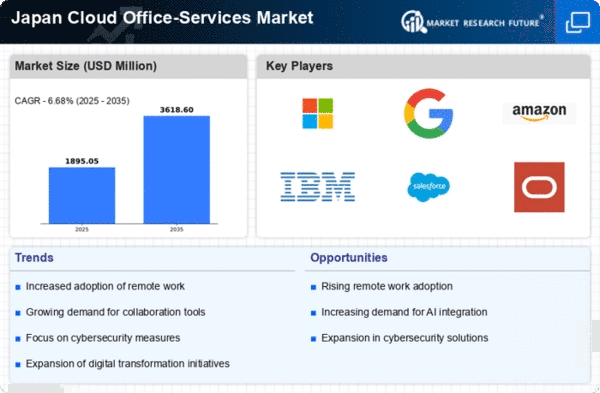Enhanced Collaboration Tools
Enhanced collaboration tools are significantly influencing the cloud office-services market in Japan. As organizations strive to improve teamwork and communication, they are increasingly adopting cloud-based platforms that facilitate real-time collaboration. Recent statistics show that approximately 75% of Japanese companies are utilizing cloud services to enhance their collaborative efforts. This trend indicates a strong preference for tools that enable seamless interaction among team members, regardless of their physical location. Consequently, the cloud office-services market is likely to expand as businesses prioritize solutions that foster effective collaboration.
Rising Importance of Cost Efficiency
Cost efficiency is emerging as a critical driver in the cloud office-services market in Japan. Businesses are increasingly recognizing the financial benefits of adopting cloud solutions, which often reduce overhead costs associated with traditional office spaces. A recent survey indicates that around 60% of companies in Japan report significant savings after transitioning to cloud-based services. This trend suggests that organizations are likely to continue investing in cloud office solutions to optimize their operational expenses. As firms seek to streamline their budgets, the cloud office-services market is expected to grow, driven by the pursuit of cost-effective alternatives.
Focus on Environmental Sustainability
Environmental sustainability is becoming a pivotal concern for businesses in Japan, impacting the cloud office-services market. Companies are increasingly seeking cloud solutions that align with their sustainability goals, as they aim to reduce their carbon footprint. A recent report suggests that around 55% of Japanese firms are prioritizing eco-friendly practices in their operations. This focus on sustainability is likely to drive the adoption of cloud office services, as organizations recognize the potential for reduced energy consumption and waste. The cloud office-services market is expected to grow as businesses align their strategies with environmental considerations.
Growing Demand for Flexible Workspaces
The cloud office-services market in Japan is undergoing a significant shift towards flexible workspaces. This trend is driven by the increasing need for businesses to adapt to changing workforce dynamics. Companies are seeking solutions that allow employees to work from various locations, enhancing productivity and job satisfaction. According to recent data, approximately 70% of Japanese firms are investing in cloud-based office solutions to facilitate remote work. This growing demand for flexibility is likely to propel the cloud office-services market, as organizations prioritize tools that support collaboration and communication across dispersed teams.
Regulatory Compliance and Data Security
Regulatory compliance and data security are paramount concerns for organizations in Japan, shaping the cloud office-services market. As businesses navigate complex regulations, they are increasingly turning to cloud solutions that offer robust security features. Recent findings indicate that approximately 65% of Japanese companies prioritize compliance when selecting cloud services. This emphasis on security and regulatory adherence is likely to drive the demand for cloud office solutions that provide comprehensive data protection. Consequently, the cloud office-services market may experience growth as organizations seek reliable services that ensure compliance with local regulations.
















